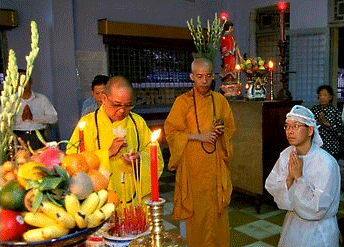 "The sense of the dead is that of the final", says a Vietnamese proverb, implying that funeral ceremonies must be solemnly organized.
"The sense of the dead is that of the final", says a Vietnamese proverb, implying that funeral ceremonies must be solemnly organized.
Formerly, funerals went as follow???s the body was washed and dressed, a chopstick was laid between the teeth and then a pinch of rice and three coins were drooped in the mouth.
The body was laid on a grass mat spread on the ground, enveloped with white cloth and put into a coffin. Finally, the funeral ceremony was officially performed. The coffin is buried and covered, but after three days of mourning, the family visits the tomb again and opens the grave for worship. Finally, after 49 days, the family stops bringing rice for the dead to the altar. And then, after 100 days, the family celebrates "tot khoc", or the end of the tears.
After one year there is a ceremony for the first anniversary of the relative???s death and after two years in the end of mourning festival.
Nowadays, morning ceremonies follow new rituals which are simplified; they consist of covering and putting the dead body into the coffin, the funeral procession, the burial of the coffin into the grave, and the visits to the tomb. The death???s family members wear a white turban or a black mourning band.
More festivals and ceremoies in Vietnam:
Vietnamese wedding ceremony!
Elephant Race Festival, Dak Lak
Let???s enjoy Thay Pagoda Festival!
Huong Pagoda Festival, lost in a world of fairies
Co Loa Festival
Buddhist legend in Keo Pagoda
Do Son Buffalo Fighting Festival - Hai Phong City Festival
Hung King Temple Festival
Saint Chu Dong Tu Festival
A meaningful pilgrimage to the Lim Festival
Full moon (Mid-Autumn) Festival
Doan Ngo Festival (T???t ??oan Ng???)
Khau Vai Love Market Festival ??? beauty of love
Vietnamese New Year
Funeral ceremony
Ancestor worship



